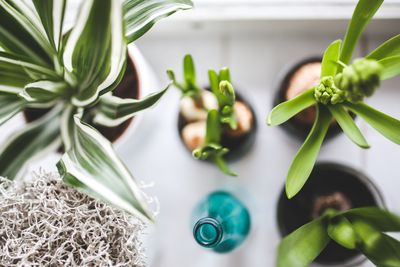How the humble houseplant became the garden industry’s fastest growth category
Published:
Read Time: 8 mins
It’s official: - 2019 was the year of the houseplant according to the GCA’s Barometer of Trade (BoT) report. Last year, the houseplant sector saw the biggest increase in sales at garden centres across the country with an increase of 17.6% compared to 2018. It is estimated that the millennial generation is responsible for one third of all houseplant sales but how did they become so popular?
How the resurgence began
One main element is the fact that bringing the outside in has become fashionable again. Particularly popular amongst “Generation Rent” and millennials, this urban trend for houseplants has taken off as residents with a lack of outside space start to create their gardens indoors.
According to the English Housing Survey, “Generation Rent” makes up 48% of households aged 25-34, up from 21% ten years ago. With many living in flats or houses with no garden, and the RHS revealing that city dwellers spend an average of 90% indoors, it is little wonder that this urban demographic are creating their own little green havens inside their homes. With the right plants and modern planters, tiny flats are being transformed into aspirational urban jungles.
Another reason why houseplants and lush indoor greenery have become so popular is thanks to their ease of care, and ability to add colour to interiors cheaply and easily. They have become the new ‘pet’ for many, or as many refer to themselves, ‘plant parents’. In a time when the traditional signs of adulthood seem out of reach, millennials have become obsessed with houseplants as they offer a sense of responsibility and home ownership without the obligations of children and mortgages. Houseplants also offer instant impact, perfect for such a busy and time-poor generation.
Additionally, houseplants also tap into the increasingly important ‘wellness’ trend, as they work to purify the air that we breath and remove toxins and other chemical nasties found in furnishings, paints, detergents and cosmetics around the home. The RHS lists several health benefits too, including reduced blood pressure and breathing problems and, if you work from home – as many of us currently find ourselves doing - studies have shown that houseplants increase attention span and improve productivity. Plants also provide a sense of connectivity, with Wyevale Garden Centre Garden Trends Report 2018 finding that 43 percent of people questioned remarked that houseplants make them feel calm.
Social Media
The GCA’s recent Barometer of Trade (BoT) report also revealed that houseplants topped the sales leaderboard for almost half the of the year, making it them a trusted and popular sales opportunity. One of the key drivers for this is said to be social media. Visual platforms such as Instagram, Tumblr and Pinterest have made houseplants so much more than a trend, they have become the must-have for millennials in the photo-centric universe of social media. Hashtags like #plantsofinstagram, #urbanjungle, #plantparenthood, #plantsmakepeoplehappy or #succulentsunday adorn carefully crafted posts and are available to view in their millions.
And that enthusiasm for all things green and leafy is something that leading indoor pot supplier Ivyline is benefiting from. “People tag us on Instagram all the time - they use #MyIvyline to be part of the community,” Ivyline Director, Scott Thomas explains. “Online and general retail have seen a huge upswing in the younger demographic. and we are also now seeing them being drawn into garden centres to shop for plants. Interior plant accessories grew by more than 40% in like for like YOY sales in 2019, whilst 2020 Q1 growth is at more than 40% once again.”
This is echoed by air plant specialists, Key Essentials. “Social media is one of the main drivers for houseplants. A customer buys a houseplant, makes a display or terrarium, names it, takes a photo and puts it on Instagram. They don’t do that with a hydrangea or rose planted in the back garden,” said Director, Mark Smith. “When we first started in 2013, air plants were a hard sell in a difficult market. Today, the business is four times larger, with strong growth up 20% at the beginning of this year. We bring out new products on a regular basis to keep our range fresh but that is not the key to future success - we must make more people aware of the product and where they can buy them, give them the confidence to buy and to support them afterwards. The internet and social media are perfect for this.”
Technology
With 95% of millennials now owning a smartphone (Statista), the garden industry is having to embrace the technology or risk being left behind. QR code technology has proven to be a fantastic aid for engaging the younger generation with horticulture, especially houseplants. SmartPlant is an app launched in 2017, that is bringing the world of plant care into the digital age and making it accessible for both the younger generation and more experienced gardener. With a simple scan of a houseplant’s QR code using the app, novice houseplant owners have immediate access to information on their new plant and monthly reminders on plant care, as well as access to horticultural experts for advice and tips.
Key Essentials is just one of many suppliers using this technology to help with sales. “The market for air plants is still very young with a huge proportion of customers finding them for the first time,” added Mark Smith. “This means we have to put more effort into education and promotion. We have signed up with the SmartPlant app, and all our products now carry their labels which is a great way for customers to get specific care information.”
With millennials consuming more and more content through their smartphones or tablets in an instant, many want information and they want it NOW. Dobbies is just one garden centre chain that has acknowledged this thirst for knowledge and has partnered with SmartPlant to digitise its entire indoor plant ranges for Spring 2020. The digital initiative enables Dobbies customers to receive rich plant content either in-store or at home.
“The SmartPlant partnership is tremendously exciting for Dobbies garden centres both from an online and offline perspective and we see enormous potential going forward. This will help us to better inform and engage our customers whilst learning from unparalleled customer insights,” explained Marcus Eyles, Horticulture Director at Dobbies.
Trends
Dobbies is also one of the pioneers of the houseplant trend and is constantly refreshing and adapting its range to appeal to the fastest growing group of garden consumers in the country as Claire Bishop, Houseplant Buyer explains: “The millennial houseplant obsession shows no sign of slowing and Dobbies wants to be at the forefront to fulfil their indoor gardening obsession.
“Foliage is set to be big. One of the most popular selling houseplants are Calatheas, due to their many different textures and colours. With over 100 different cultivars, their bright, bold leaf markets and many shapes and sizes mean they cater for every houseplant enthusiast. Smaller specimens are excellent picks for tabletop displays or windowsills; the whilst larger varieties make fantastic statement floor plants or on plant stands.
“Cactus and succulents are still bestsellers, but we are finding that collectors are looking for more special and unusual varieties to add to their collections, so we have been diversifying our range in-store. Our most popular varieties include Haworthia, Aloe and Echeveria which are easy to love and care for and perfect for well-lit interiors and windowsills.
“A big trend emerging is hydroponics. Growing plants in just water and nutrients has seen an increase in recent years as planters don’t take up as much space and can be grown in any shape to suit. Ideal for the amateur garden, hydroponic plants are straightforward to care for and have now been made contemporary, thanks to LED lighting, ideal to brighten up a desk or any dark corner. Most plants can be grown in water as long as the base leaf is kept above the water line – Clusia are great, as are Monstera and Spathyphyllum with their lush green foliage, making them ideal of those wanting to create a contemporary urban jungle.”
With sustainability in the forefront of the public’s minds, Dobbies has also recently introduced its fully sustainable EasyCare range, grown in recycled coir, and great for those with busy, hectic lifestyles as they can last up to 45 days without watering.
As more and more recognise the health benefits of having houseplants in the home, Dobbies new Air So Pure collection is scientifically proven to detoxify the air in living spaces and improve our wellbeing by reducing stress, enabling relaxation, as well as help improve mood and sleep quality.
Dobbies has ensured it is trendsetting and leading the way explains Claire: “We have been sourcing plants and products that will appeal to consumers for next season. Even the demand for the Phalaenopsis common orchid, the number one flowering houseplant is changing with customers now looking for something new. Dobbies has listened to demand and introduced longer flowering varieties such as Clivia, Cymbidium Orchids, Bromeliads. The houseplant trend is certainly thriving and looks to be going nowhere anytime soon.”
So, what next for houseplants? New varieties? New ways of growing? How will technology shape consumer engagement? Only time will tell……and we can’t wait to see what comes next.
Ends
Editors notes
Comprising a uniquely collaborative network of senior PR professionals based at offices around England, Hornby Whitefoot PR has helped a wide range of companies and brands to communicate their news, build business and reposition their reputations since 2015. From strategy to tactics, project management to copy-writing, Hornby Whitefoot PR offers flexible, proactive public relations expertise, founded on real business and marcomms understanding. And our ‘open book’, annual budget or project-based approach – with no murky retainers to hide behind – means you can trust us to make your money go further. Specialisms include the garden, home and lifestyle sector, and the automotive aftermarket industry.

